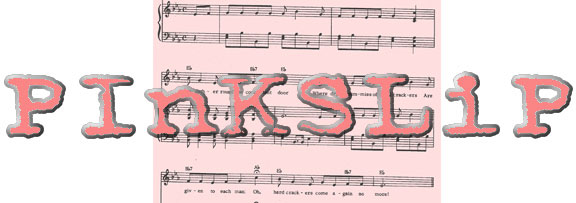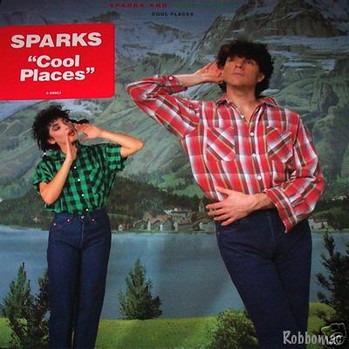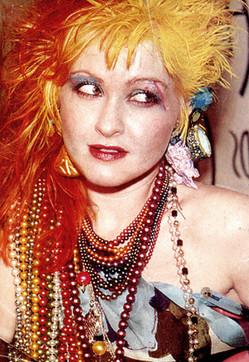P I n K S L i P: Preserve the Integrity of Key Song Lyric Pronouns
When artists perform cover versions of songs, they often alter the
lyrics to match the gender of the new singer. For example, a male
singer doing a cover of the
Diana Ross song "Upside Down" might change
the words "Boy, you turn me inside out" to "Girl, you turn me inside
out." It would be unheard of for a person doing a spoken-word
reading of a literary classic to change the text's gender references
according to whim. It should be equally unheard of for a singer
to alter the lyrics of a song. This all-too-common practice
violates the integrity of the original song and, in fact, often
prevents fresh new subtexts from arising.
What kind of fresh new subtexts, you ask? Consider
Information
Society's cover of "Express Yourself" by
Madonna. Had singer
Kurt
Harland retained the original lyrics, he would have turned "Express
Yourself" into a feminist manifesto from a male point of view, making
the song vastly more interesting and important. Instead, he
alters the pronouns throughout and his remake falls flat. For
example, Harland changes the lyric "make him express how he feels and
then you'll know your love is real" to "make her express how she feels
and then you'll know your love is real." Females don't generally
have too much trouble communicating their feelings; expressiveness is
typically more difficult for males. So the changed lyrics lose
their original meaning and indeed border on the ridiculous. Had
Harland left the original pronouns untouched, he would have transformed
the song into a cautionary tale for women from a man's point of
view. The singer would be encouraging women to demand only the
best from men, benefiting both genders in the process. (The cover
version is available on the Madonna tribute album "Virgin Voices." The
original version is available on the Madonna album "Immaculate
Collection.")
Sometimes lyric alterations totally obliterate the artist's original
meaning. Take, for example,
Loleatta Holoway's cover of "I Wanna
Be Your Lover" by
Prince. As part of her removal of masculine
references, Holoway changes the lyrics "I wanna be your brother, I
wanna be your mother and your sister, 2" to "I wanna be your lover, I
wanna be your mother and your sister, 2." As Prince wrote the
lyrics, the singer is offering to transcend the limitations of gender
roles. He is offering the support of brotherhood, the nurturing
of motherhood, and the sharing of sisterhood to the woman he
desires. He is suggesting that he will be a new family for her,
ready and able to fulfill her every need. Holoway carelessly
erases this important aspect of the song's meaning, making her cover
version pale by comparison. (The cover version is available on the
Prince tribute album "Party O' the Times." The original version
is available on Prince's self-titled album.)
Let's contrast these bad examples with another Madonna cover, but this time one which works brilliantly:
KMFDM's cover of "Material Girl" by Madonna. A scary, distorted
masculine voice tells us that "we are living in a material world" and
that he is a "material girl."
En Esch sings, "Some boys kiss me,
some boys hug me, I think they're O.K. If they don't give me
proper credit, I just walk away." By retaining the original lyrics and
switching the gender of the singer, the cover version takes an
intriguing look at the connection between materialism and gender
identity. While Madonna suggests that people use their sex appeal
to court others for personal gain, En Esch further suggests that people
of one's same gender ultimately have the most to offer and that such
courtships must be handled delicately. (The cover version is
available on the Madonna tribute album "Virgin Voices." The
original version is available on the Madonna album "Like a Virgin.")
Further insights into gender identity are gained in the following covers:
Erasure's cover of "River Deep, Mountain High" by
Ike and Tina
Turner.
Andy Bell of Erasure preserves the song's original
lyrics, singing such lines as "When I was a little girl I had a
ragdoll." The song takes on new meaning by exploring how gender
identities and boundaries are defined during early childhood.
(The cover version is available on the Erasure album "Innocents."
The original version is available on the album "Best of Ike and Tina
Turner.")
Biftek's cover of "Wired For Sound" by
Cliff Richards. Lead
singer
Julee Cruise stays true to the original song, singing "I was a
small boy who did not like his toys" and "I met a girl and she told me
she loved me." As with the Erasure cover of "River Deep, Mountain
High," this song is given added depth by examining early formations of
gender identity. (The cover version is available on the Biftek
album "2020." The original version is available on the Cliff
Richards album "Whole Story: His Greatest Hits.")
Future Bible Heroes' cover of "Don't You Want Me" by the
Human
League. This popular male-female duet gets switched around in the
cover version, with the man singing that he was "working as a waitress
in a cocktail bar." By retaining the original lyrics and
switching the genders of the singers, the song explores traditional
gender roles in a refreshing new way. (The cover version is
available on the Human League tribute album "Reproductions." The
original version is available on the Human League album "Dare.")
Male-male relationship subtexts are created in the following covers:
The 6ths with
Lloyd Cole's cover of "Human" by the Human League.
This popular male-female duet is here sung by two men, each apologizing
for cheating on the other during a period of separation. One man
says to the other, "I wouldn't ever try to hurt you. I just
needed someone to hold me, to fill the void while you were gone, to
fill this space of emptiness." The cover version brings new
meaning to the lyrics as it explores the challenge of maintaining
stable same-sex relationships. (The cover version is available on
the Human League tribute album "Reproductions." The original
version is available on the Human League album "Greatest Hits.")
The Beatles' cover of "Boys" by the
Shirelles. Since the Beatles
often covered Motown material in their early days, no one seemed to
raise an eyebrow at this. But when you hear
Ringo singing about
boys ("Well, I talk about boys, now; what a bundle of joy!") it's
rather intriguing. (The cover version is available on the Beatles
album "Anthology." The original version is available on the
Shirelles' album "25 All-Time Greatest Hits.")
Erasure's cover of "Gimme Gimme Gimme (A Man After Midnight)" by
ABBA. By preserving the original lyrics, Erasure subverts the
song into a gay anthem. Andy Bell sings, "Gimme gimme gimme a man after
midnight. Take me through the darkness to the break of the
day." (The cover version is available on the Erasure album "The
Two Ring Circus." The original version is available on the ABBA
album "ABBA Gold.")
Female-female relationship subtexts alter the storylines in the following songs:
Missing Persons' cover of "Hello I Love You" by the
Doors. By
changing the gender of the singer while retaining the original lyrics,
Missing Persons brings new depth to the song. When
Dale Bozzio
sings, "Do you think you'll be the guy to make the queen of the angels
sigh?" she can be referring to herself as a guy as well as referring to
a male listener. (In the Doors' version, that lyric is a bit of
internal dialog as the singer thinks aloud to himself.) When
Bozzio sings, "Her arms are wicked, and her legs are long; when she
moves my brain screams out this song," she brings a lesbian sensibility
to the lyrics. Now, the listener realizes that the beautiful
stranger on the street has many admirers fighting for her attention,
both male and female. (The cover version is available on the
reissue of the Missing Persons album "Color in Your Life." The
original version is available on the Doors' album "Best of the Doors.")
Six Pence None The Richer's cover of "There She Goes" by
The
La's. By retaining the original lyrics, the band gives the song a
new female-infatuated-by-female slant.
Leigh Nash sings, "There
she goes again, racing through my brain, and I just can't contain these
feelings that remain." This was a bit unusual for mainstream pop,
especially for a band with a "Christian Rock" past. (The cover
version is available on Six Pence None The Richer's self-titled
album. The original version is available on the La's self-titled
album.)
Sandra Bernhard's cover of "Me and Mrs. Jones" by
Billy Paul. By
retaining the original lyrics, Bernhard transforms the song into a love
affair between herself and a married woman, thereby adding a brand new
dimension to a familiar story. Bernhard sings, "Me and Mrs.
Jones, we've got a thing going on." (The cover version is
available on Sandra Bernhard's video "Without You I'm Nothing."
The original version is available on the Billy Paul album "Me &
Mrs. Jones-Best of Billy Paul.") Similarly, Bernhard brings a
lesbian flair to "Little Red Corvette" by Prince. She sings,
"Girl, you got an ass like I never seen; And the ride... I say the ride
is so smooth you must be a limousine." (The cover version is
available on Sandra Bernhard's video "Without You I'm Nothing."
The original version is available on the Prince album "1999.")
Rebecca Romijn Stamos' cover of "Darling Nikki" by Prince. Like
the "There She Goes" cover by Six Pence None The Richer, Rebecca Romijn
Stamos brings a female-infatuated-by-female slant to "Darling
Nikki." Stamos sings, "I can't tell u what she did 2 me, but my
body will never be the same." (The cover version is available on
the Prince tribute album "Party O' the Times." The original version is
available on the Prince album "Purple Rain.")
Honorable mention goes to
Momus's covers of songs he wrote for
Kahimi
Karie. Momus disregards the gender references in his own lyrics, adding
new subtexts to songs he composed for a female singer. In "The
Lady Of Shalott," he describes himself as a woman: "I am a kind of Lady
of Shallot; My drawbridge, portcullis and moat; The chastity belt round
my throat." In "Mistaken Memories Of Medieval Manhattan," Momus
addresses another man in his bed: "Never wake me, boy; If you wake me
I'll die; If you wake me you'll destroy this perfect world I see when I
dream." In "The Seventh Wife Of Henry VIII," Momus is a suitor to
the notorious British king: "Well I know he might seem to be a big
brute, but he waits on me hand and foot. And when I blow upon his
flute, he plays 'Greensleeves' on a lute." In "Pygmalism," Momus
addresses a male professor: "You filled me with your breath and your
jism. You gave me life, I give you death, pig; Pygmalism."
(The cover versions are available on
Momus' web site. The original versions are available on the Kahimi Karie album "Journey To The Centre Of Me." )
It is insulting to the audience to adjust song lyrics, as if we can't
take them as they were written. Should the artist perhaps alter
lyrics based upon the audience, as for example making it all male in a
gay bar, all female at a NOW meeting, or all dog at the Kennel
Club? Though it may or may not be discrimination to make this
usually heterosexual adjustment, it's certainly trite and silly, and
really more about a lack of confidence in the song than anything
else. Music, poetry, and art in any form should speak to us on
some universal level, which could not be limited by pronoun or place.
The offense of lyrics alteration lies in the superficiality of the
thing.
Please participate in the PInKSLiP campaign by submitting your good or bad song lyric examples to
webmaster@oneletterwords.com
(Thanks to
Ken Clinger and
June Conley for sharing their expertise.)






